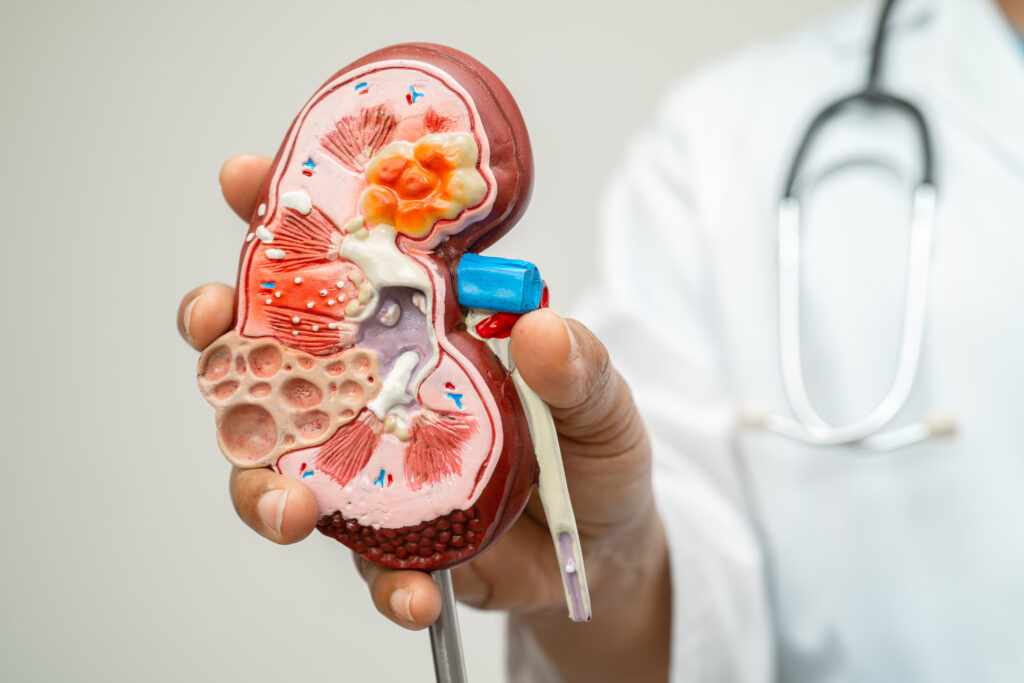
Kidney shrinkage, also known as renal atrophy, is a condition where one or both kidneys become smaller than their normal size. Healthy kidneys are vital for filtering waste, balancing fluids, regulating blood pressure, and supporting overall body function. When the kidneys shrink, it indicates long-term damage to kidney tissues and nephrons—the tiny filters responsible for purification. Timely diagnosis and proper treatment are essential to slow the progression and preserve remaining kidney function.
Causes of Kidney Shrinkage
Kidney shrinkage can develop due to several long-standing health issues. Common causes include Chronic Kidney Disease (CKD), reduced blood flow to the kidneys, recurrent infections, uncontrolled diabetes and hypertension, or obstruction in the urinary tract. Over time, these conditions damage kidney tissues, causing them to lose their ability to function efficiently. When untreated and allowed to worsen, the kidneys gradually shrink and harden, leading to decreased filtration capacity.
Symptoms to Watch For
Many patients do not notice early symptoms because kidney damage progresses silently. As the condition advances, symptoms may include fatigue, swelling in feet and hands, frequent urination, foamy urine, loss of appetite, and persistent weakness. Some may also experience high blood pressure, nausea, or difficulty concentrating. Identifying these signs and seeking early medical help can significantly improve treatment outcomes.
Treatment Approaches
The primary goal of kidney shrinkage treatment is to slow further damage, improve kidney function, and manage underlying causes. Since kidneys cannot regenerate lost nephrons, timely treatment helps preserve the function of the remaining healthy ones.
Medical Management:
Doctors typically recommend medications to control blood pressure, manage diabetes, reduce infections, and regulate electrolyte levels. Maintaining a healthy lifestyle—such as reducing salt intake, staying hydrated, and following a renal-friendly diet—also plays a crucial role.Ayurvedic Treatment for Kidney Shrinkage:
Ayurvedic therapies focus on natural, holistic methods to enhance kidney strength, repair tissue damage, and improve overall renal health. Herbs like Punarnava, Gokshura, Varun, and Palasha support kidney cleansing and promote better filtration. Panchakarma therapies such as Virechana, Basti, and Herbal detoxification help reduce toxin buildup, improve circulation, and reduce inflammation in kidney tissues. Ayurveda aims to restore balance in the body and strengthen kidney function naturally.Diet & Lifestyle Modifications:
A well-planned kidney-friendly diet helps reduce strain on the kidneys. This includes limiting protein, reducing sodium, avoiding processed foods, and incorporating hydrating, nutrient-rich fruits and vegetables. Regular monitoring, gentle exercise, and stress reduction techniques like yoga and meditation greatly support recovery.Advanced Interventions:
In severe cases, where kidney shrinkage leads to significantly reduced function, dialysis or transplant may be recommended. However, many patients can delay or avoid such procedures with proper management and early treatment.
Conclusion
Kidney shrinkage is a serious but manageable condition when diagnosed early. A combination of medical care, Ayurveda, and lifestyle improvements can help slow its progression, support remaining kidney function, and enhance quality of life. Consistent monitoring and following a personalized treatment plan are key to preventing further kidney damage and maintaining long-term renal health.
Write a comment ...